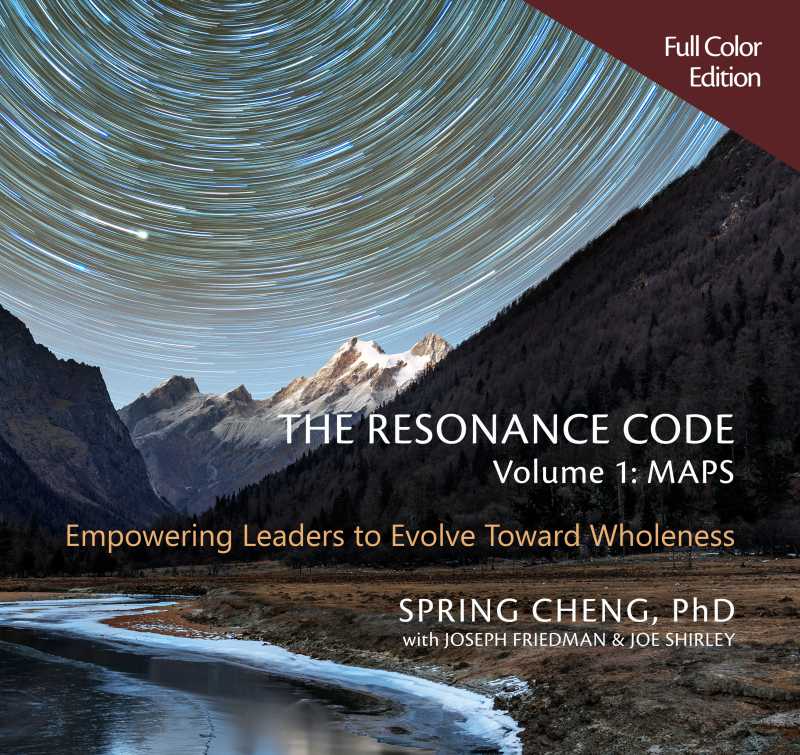Introducing The Resonance Code, Volume 1: Maps
by Spring Cheng
with Joseph Friedman and Joe Shirley

Our book The Resonance Code Volume 1: MAPS is now on Amazon in both full color and black-and-white editions. (See all Amazon links below.) Aside from the text, a significant amount of information in the book is conveyed through illustrations and drawings. The graphics and photographs weave a rich background tapestry to the presentation.
Here is from the back cover:
Human civilization is at a crossroads. Challenges of immense volatility and uncertainty press us to evolve our ourselves at a greater pace than we have ever done. We need to heal and revitalize the inner terrain of the psyche so our consciousness can respond creatively to the complexity that surrounds and challenges us.
The Resonance Code is born of a marriage between ancient and modern, East and West. Its ancient and Eastern sources are Taoist Philosophy and the I Ching, one of Earth’s most ancient complexity theories. Its modern and Western sources are contemporary theories of human development and practices of leadership coaching. According to the Taoist framework, the human psyche functions as an organic “resonator,” directly exchanging and amplifying resonance – known as qi – with its social and natural environment. Qi carries information essential for our growth and thriving as individuals and as a species. However, on our modern, materialistic path of development, our cognitive minds struggle to process this subtle exchange between ourselves and our environment. This disconnection leads to much of the grief, loneliness, and pervasive distress we experience today.
The Resonance Code presents a knowledge system developed through a leadership training curriculum at Resonance Path Institute. This system aims at awakening the psyche to resonance. It enables the rational mind to evolve beyond current limitations so we can dance with complexity and embrace uncertainty as the fertile ground of creativity. The Resonance Code is calling forth a new generation of resonance leaders. These are people who may or may not hold conventional leadership titles, but who love the Earth, feel compassion for all its inhabitants, and are committed to participate in humanity’s evolutionary journey.
An electronic version of the book is available for viewing and download below.
View The Resonance Code here in your browser:
Download The Resonance Code as a PDF:
If you download the PDF, we invite you to make a contribution to our work. You may select the amount that feels right to you.
亲爱的中国读者:捐赠请扫下面的二维码。谢谢!
Chinese readers: you may contribute through the QR code below.

Purchase the paperback on Amazon:
Buy closest to home to minimize shipping. (All copies in English.)
Full-Color Edition ($45 US)
Black-and-White Edition ($15.95 US)
Reviews of The Resonance Code: Empowering Leaders to Evolve Toward Wholeness
From Alan Zulch, Senior Director at Tamalpais Trust:
African American poetess Audre Lorde wrote, “the master’s tools will never dismantle the master’s house.” I have studied many sophisticated analyses and critiques of the old paradigm that is crumbling right now. While useful, these analyses represent refined sets of the master’s tools, still working within the narrow frame of linear rationality and causation, still hoping for a remodel or refinement of our status quo. Whereas, The Resonance Code provides tools to bridge toward and live into the new paradigm. These tools are, in effect, meta-tools, which have the capacity to not only dismantle the master’s house deep into the foundation, but to build an entirely new one.
Excerpt from a full-length review, written by Dorian Cave, PhD candidate at Cumbria University, Curator of Deep Adaptation Forum:
The Resonance Code is a most wonderful bridge to walk in order to grasp some of the crucial thinking that makes up the unique philosophical and spiritual “DNA” of ancient China: the endlessly inspiring system of ideas known as Taoism – and one of its roots, the Book of Changes (I Ching). Even more importantly, by presenting a framework and set of practices to articulate these ideas with a more Western heritage, this book also enables its readers to draw from this deep and often cryptic thinking to enrich, enliven, and even transform their everyday life. This is no small feat.”
Read Dorian’s full review here. (Dorian uses his pen name Don Caviare on this site.)
